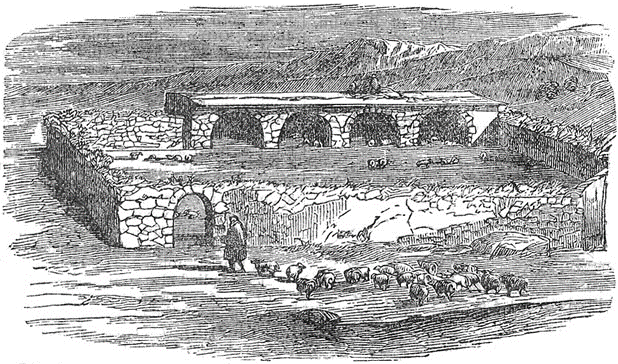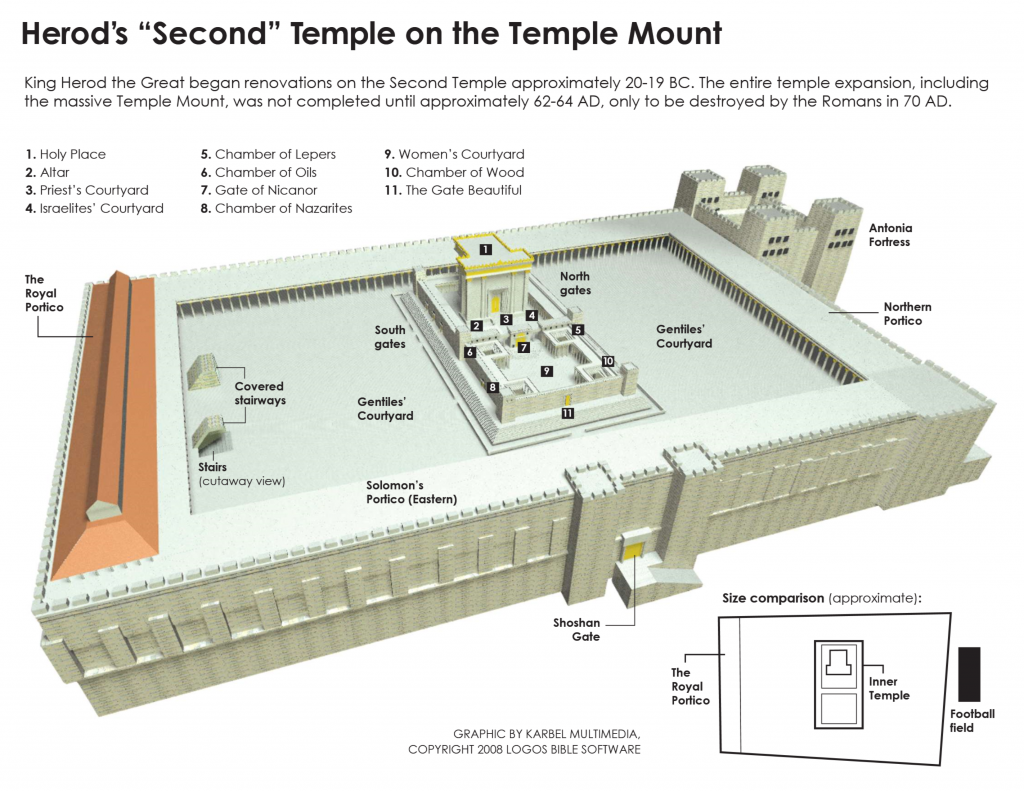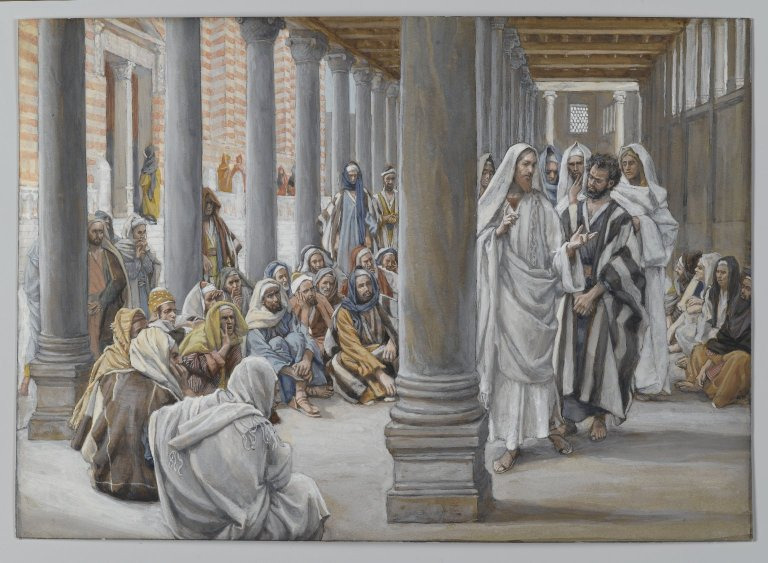John 10
約翰福音 10:1–21 (中文聖經和合本(神版.繁體)) — 1 我實實在在地告訴你們:人進羊圈,不從門進去,倒從別處爬進去,那人就是賊,就是強盜。2 從門進去的,才是羊的牧人。3 看門的就給他開門,羊也聽他的聲音。他按著名叫自己的羊,把羊領出來。4 既放出自己的羊來,就在前頭走,羊也跟著他,因為認得他的聲音。5 羊不跟著生人,因為不認得他的聲音,必要逃跑。”6 耶穌將這比喻告訴他們,但他們不明白所說的是甚麼意思。 7 所以耶穌又對他們說:“我實實在在地告訴你們:我就是羊的門。8 凡在我以先來的,都是賊,是強盜,羊卻不聽他們。9 我就是門,凡從我進來的,必然得救,並且出入得草吃。10 盜賊來,無非要偷竊、殺害、毀壞;我來了,是要叫羊得生命,並且得的更豐盛。11 我是好牧人,好牧人為羊捨命。12 若是雇工,不是牧人,羊也不是他自己的,他看見狼來,就撇下羊逃走;狼抓住羊,趕散了羊群。13 雇工逃走,因他是雇工,並不顧念羊。14 我是好牧人,我認識我的羊,我的羊也認識我。15 正如父認識我,我也認識父一樣,並且我為羊捨命。16 我另外有羊,不是這圈裡的;我必須領他們來,他們也要聽我的聲音,並且要合成一群,歸一個牧人了。17 我父愛我,因我將命捨去,好再取回來。18 沒有人奪我的命去,是我自己捨的。我有權柄捨了,也有權柄取回來,這是我從我父所受的命令。” 19 猶太人為這些話又起了紛爭。20 內中有好些人說:“他是被鬼附著,而且瘋了,為甚麼聽他呢?”21 又有人說:“這不是鬼附之人所說的話,鬼豈能叫瞎子的眼睛開了呢?”
John 10:1–21 (NASB95) — 1 “Truly, truly, I say to you, he who does not enter by the door into the fold of the sheep, but climbs up some other way, he is a thief and a robber. 2 “But he who enters by the door is a shepherd of the sheep. 3 “To him the doorkeeper opens, and the sheep hear his voice, and he calls his own sheep by name and leads them out. 4 “When he puts forth all his own, he goes ahead of them, and the sheep follow him because they know his voice. 5 “A stranger they simply will not follow, but will flee from him, because they do not know the voice of strangers.” 6 This figure of speech Jesus spoke to them, but they did not understand what those things were which He had been saying to them. 7 So Jesus said to them again, “Truly, truly, I say to you, I am the door of the sheep. 8 “All who came before Me are thieves and robbers, but the sheep did not hear them. 9 “I am the door; if anyone enters through Me, he will be saved, and will go in and out and find pasture. 10 “The thief comes only to steal and kill and destroy; I came that they may have life, and have it abundantly. 11 “I am the good shepherd; the good shepherd lays down His life for the sheep. 12 “He who is a hired hand, and not a shepherd, who is not the owner of the sheep, sees the wolf coming, and leaves the sheep and flees, and the wolf snatches them and scatters them. 13 “He flees because he is a hired hand and is not concerned about the sheep. 14 “I am the good shepherd, and I know My own and My own know Me, 15 even as the Father knows Me and I know the Father; and I lay down My life for the sheep. 16 “I have other sheep, which are not of this fold; I must bring them also, and they will hear My voice; and they will become one flock with one shepherd. 17 “For this reason the Father loves Me, because I lay down My life so that I may take it again. 18 “No one has taken it away from Me, but I lay it down on My own initiative. I have authority to lay it down, and I have authority to take it up again. This commandment I received from My Father.” 19 A division occurred again among the Jews because of these words. 20 Many of them were saying, “He has a demon and is insane. Why do you listen to Him?” 21 Others were saying, “These are not the sayings of one demon-possessed. A demon cannot open the eyes of the blind, can he?”
Title 題目:Jesus the Good Shepherd 耶穌是好牧人

Ancient Sheepfold: This sheepfold, with high, thorn-topped stone walls and only one entrance, offers both covered and uncovered shelter for the sheep, allowing them safe time in the sun on cold days and a dry place during the rainy season. The sheepfold keeps the sheep from wandering off and provides a barrier that predators can’t cross. Jesus calls himself both the shepherd and the door to the sheepfold in John 10:1-16.
Logos Bible Images by Richard Myers
古代羊圈:這個羊圈有高高的、頂部有刺的石牆,只有一個入口,為羊提供有蓋和無蓋的庇護所,讓它們在寒冷的日子里安全地享受陽光,在雨季有乾燥的地方。羊圈可以防止羊走失,並提供掠食者無法跨越的屏障。在約翰福音 10:1-16 中,耶穌稱自己為牧人和羊圈的門。
理查德·邁爾斯的《聖經》圖像徽標
1-2. Jesus made a distinction between a robber and a shepherd. What is it? What is the door (ref v. 7)? What else enters by the door? 耶穌區分了強盜和牧羊人。 是什麼的區分?什麼是門(參考 第七節)?還有什麼東西可以從門口進去?
- Who is the doorkeeper? How intimate is the relationship between the shepherd and the sheep? What does it mean that the sheep hear his voice? 誰是看門人? 牧羊人和羊群的關係有多親密?『羊也聽他的聲音』意味著什麼?
- What is the process of leading the sheep to the field? What is the process for a sheep to know the voice of the shepherd? How do these two processes similar in helping us get to know Jesus’ voice? 牽羊到田裡的過程是怎麼樣的? 羊認識牧羊人的聲音是怎樣的過程? 這兩個過程在幫助我們認識耶穌的聲音上有何相似之處?
- Why do the sheep flee from the stranger? What is a stranger’s voice for a believer? 為什麼羊要逃離陌生人? 對信徒來說,陌生人的聲音是什麼?
- What did the disciples not understand Jesus’ saying? How do we avoid this shortcoming? 門徒們不明白耶穌所說的話的是什麼? 我們該如何避免這個缺點呢?
7-9. Why is Jesus the door of the sheep? Was there a door before Jesus came to the world? What are the two benefits of entering the door in v. 9? 為什麼耶穌是羊的門? 耶穌降世前有門嗎? 第九節列出進門的哪兩個好處?
- What is the objective of the thief? What are Jesus’ objectives? 小偷的目的是什麼? 耶穌的目標是什麼?
- Besides giving the sheep the benefits of eternal life and pasture, what makes Jesus the shepherd good? 除了為羊帶來永生和牧場的好處之外,耶穌這牧羊人是甚麼的好?
12-13. Is the hired hand a thief? What are the significant differences between him and the good shepherd? What is the other identity of the good shepherd? How is this identity unusual in the day of Jesus for a shepherd? 僱工是小偷嗎? 他和好牧人有什麼顯著的差異? 好牧人的另一個身分是什麼? 對耶穌時代的牧羊人來說,這種身分有何不同尋常?
14-15. Jesus repeats the knowing part and extends it to the level of him knowing the Father. How does the good shepherd love His sheep? 耶穌重複了認識的部分,並將其延伸到他認識天父的層面。 好牧人如何愛他的羊?
- Mormon uses this verse to prove that they are the flock. According to LDS Apostle James E. Talmage, “The ‘other sheep’ here referred to constituted the separated flock or remnant of the house of Joseph, who, six centuries prior to the birth of Christ, had been miraculously detached from the Jewish fold in Palestine, and had been taken beyond the great deep to the American continent” (Jesus the Christ, p. 419). Source: https://www.mrm.org/john-10-16. What does Jesus mean by “the other sheep? 摩門教用這節經文來證明他們是羊群。 根據摩門教使徒詹姆斯·E·塔爾馬奇的說法,“這裡所指的’另外的羊’是指約瑟家族中分離出來的羊群或餘民,約瑟家族在基督誕生前六個世紀,就奇蹟般地從猶太人的圈子中分離出來。資料來源:https://www.mrm.org/john-10-16。 耶穌所說的「另外的羊」是什麼意思?
- Why does the Father love Jesus? What does it mean that Jesus will take it again? 天父為什麼愛耶穌? 耶穌會再取回來是什麼意思?
- How many times in this passage did Jesus say that He would lay down His life? What is the emphasis in this verse? What do the other verses emphasize (vv 11, 15 and 17)? 耶穌在這段經文中有多少次說祂要捨掉自己的生命?這節經文的重點是什麼? 其他經文強調什麼(11、15 和 17 節)?
19-21. What is the support for saying that Jesus is demon-possessed? What is the support to refute the demon-possessed theory? 說耶穌被鬼附的說法有什麼依據呢? 反駁鬼附論的依據是什麼?
約翰福音 10:22–42 (中文聖經和合本(神版.繁體)) — 22 在耶路撒冷有修殿節,是冬天的時候。23 耶穌在殿裡所羅門的廊下行走。24 猶太人圍著他說:“你叫我們猶疑不定到幾時呢?你若是基督,就明明地告訴我們。”25 耶穌回答說:“我已經告訴你們,你們不信。我奉我父之名所行的事可以為我作見證;26 只是你們不信,因為你們不是我的羊。27 我的羊聽我的聲音,我也認識他們,他們也跟著我;28 我又賜給他們永生,他們永不滅亡,誰也不能從我手裡把他們奪去。29 我父把羊賜給我,他比萬有都大,誰也不能從我父手裡把他們奪去。30 我與父原為一。” 31 猶太人又拿起石頭來要打他。32 耶穌對他們說:“我從父顯出許多善事給你們看,你們是為哪一件拿石頭打我呢?”33 猶太人回答說:“我們不是為善事拿石頭打你,是為你說僭妄的話;又為你是個人,反將自己當作神。”34 耶穌說:“你們的律法上豈不是寫著‘我曾說你們是神’嗎?35 經上的話是不能廢的。若那些承受神道的人,尚且稱為神;36 父所分別為聖,又差到世間來的,他自稱是神的兒子,你們還向他說‘你說僭妄的話’嗎?37 我若不行我父的事,你們就不必信我;38 我若行了,你們縱然不信我,也當信這些事,叫你們又知道又明白:父在我裡面,我也在父裡面。”39 他們又要拿他,他卻逃出他們的手走了。 40 耶穌又往約旦河外去,到了約翰起初施洗的地方,就住在那裡。41 有許多人來到他那裡,他們說:“約翰一件神蹟沒有行過,但約翰指著這人所說的一切話都是真的。”42 在那裡信耶穌的人就多了。
John 10:22–42 (NASB95) — 22 At that time the Feast of the Dedication took place at Jerusalem; 23 it was winter, and Jesus was walking in the temple in the portico of Solomon. 24 The Jews then gathered around Him, and were saying to Him, “How long will You keep us in suspense? If You are the Christ, tell us plainly.” 25 Jesus answered them, “I told you, and you do not believe; the works that I do in My Father’s name, these testify of Me. 26 “But you do not believe because you are not of My sheep. 27 “My sheep hear My voice, and I know them, and they follow Me; 28 and I give eternal life to them, and they will never perish; and no one will snatch them out of My hand. 29 “My Father, who has given them to Me, is greater than all; and no one is able to snatch them out of the Father’s hand. 30 “I and the Father are one.” 31 The Jews picked up stones again to stone Him. 32 Jesus answered them, “I showed you many good works from the Father; for which of them are you stoning Me?” 33 The Jews answered Him, “For a good work we do not stone You, but for blasphemy; and because You, being a man, make Yourself out to be God.” 34 Jesus answered them, “Has it not been written in your Law, ‘I said, you are gods’? 35 “If he called them gods, to whom the word of God came (and the Scripture cannot be broken), 36 do you say of Him, whom the Father sanctified and sent into the world, ‘You are blaspheming,’ because I said, ‘I am the Son of God’? 37 “If I do not do the works of My Father, do not believe Me; 38 but if I do them, though you do not believe Me, believe the works, so that you may know and understand that the Father is in Me, and I in the Father.” 39 Therefore they were seeking again to seize Him, and He eluded their grasp. 40 And He went away again beyond the Jordan to the place where John was first baptizing, and He was staying there. 41 Many came to Him and were saying, “While John performed no sign, yet everything John said about this man was true.” 42 Many believed in Him there.
Title 題目:Jesus the Messiah耶穌彌賽亞
- Dedication, Feast of the—(John 10:22, 42), i.e., the feast of the renewing. It was instituted b.c. 164 to commemorate the purging of the temple after its pollution by Antiochus Epiphanes (b.c. 167), and the rebuilding of the altar after the Syrian invaders had been driven out by Judas Maccabaeus. It lasted for eight days, beginning on the 25th of the month Chisleu (December), which was often a period of heavy rains (Ezra 10:9, 13). It was an occasion of much rejoicing and festivity.[1]
Feast of Dedication (Hanukkah)
The Feast of Dedication—also called the Festival of Lights or Hanukkah—commemorated the cleansing of the temple during the Maccabean Revolt. It had been defiled by the Seleucid ruler Antiochus IV Epiphanes, but the Maccabees restored it in 164 bc. The name “Festival of Lights” comes from a legend: when the altar was rededicated, there was only oil enough for one day. The temple menorah miraculously remained lit for eight days. For this reason, Hanukkah was celebrated for eight days beginning on the 25th of Kislev (1 Macc 4:52–59). Its festivities were similar to those for the Feast of Tabernacles (2 Macc 10:6).[2]
The Maccabees, they family of Mattathias, fought against the rule of Antiochus IV Epiphanes of the Hellenistic Seleucid dynasty. The Maccabees founded the Hasmonean royal dynasty and established Jewish independence in the Land of Israel for about one hundred years, from 165 B.C.E. to 63 B.C.E. Their defeat of a much larger power was a remarkable feat. The Hasmoneans succeeded in winning back a considerable portion of Solomon’s old empire. By this time Antiochus had died and his successor agreed to the Jews’ demand for independence. In the year 142 BCE, after more than 500 years of subjugation, the Jews were again masters of their own fate. The Hasmonean dynasty was a Jewish dynasty of priests that ruled Judea from 140 BCE to 37 BCE. The Hasmoneans became a client state of the Romans when they were conquered by the Roman general Pompey in 63 BCE. The Hasmonean dynasty came to an end in 37 BCE when Herod the Great, a Roman-appointed king, killed the last Hasmonean ruler, Antigonus II Mattathias. Herod went on to rule Judea as a vassal state of Rome.
奉獻節、節慶(修殿節)—(約翰福音 10:22、42),即更新的節期。它是在公元前164 製定的。 是為了紀念安提阿古四世(西元前 167 年)污染聖殿之後的淨化,以及猶大·馬加比趕走敘利亞侵略者之後重建祭壇。這場節慶持續八天,從基斯流月(十二月)二十五日開始,這季節經常會下大雨(以斯拉記 10:9, 13)。這是一個歡慶和喜慶的場合。
獻殿節(光明節)(修殿節) 獻殿節(也稱為燈節或光明節)是為了紀念馬加比起義期間淨化聖殿的事件。它曾被塞琉古統治者安提阿古四世·伊皮法內斯玷污,但馬加比家族於公元前 164 年對其進行了修復。 「燈節」這個名字來自一個傳說:當重新奉獻祭壇時,燈裡的油只夠用一天。聖殿裡的燭台奇蹟般地持續亮了八天。因此,光明節從基斯流月 25 日開始慶祝八天(1 Macc 4:52-59)。其慶祝活動與住棚節相似 (2 Macc 10:6)。
馬加比家族(馬塔提亞斯家族)反抗希臘化塞琉古王朝安提阿古四世的統治。馬加比家族建立了哈斯蒙尼王朝,並從公元前 165 年至西元前 63 年開始在以色列土地上建立了猶太人獨立政權,統治時間約為一百年。他們擊敗了比自己強大得多的強國,這是了不起的成就。哈斯蒙尼王朝成功奪回了所羅門舊帝國的相當一部分領土。此時安提阿已去世,他的繼任者同意了猶太人的獨立要求。西元前142年,經過500多年的壓迫之後,猶太人再次掌握了自己的命運。哈斯蒙尼王朝是猶太祭司王朝,從西元前 140 年到西元前 37 年統治猶太。西元前 63 年,哈斯蒙尼王朝被羅馬將軍龐培征服,從此哈斯蒙尼王朝成為羅馬的附庸國。西元前 37 年,羅馬任命的國王希律大帝殺死了最後一位哈斯蒙尼王朝的統治者安提柯二世·馬塔提亞斯,哈斯蒙尼王朝宣告終結。希律繼續統治猶太。
- Soloman Portico 所羅門的廊


- In John’s account, what does the group ‘the Jews” represent? With this understanding, why do they ask Jesus to identify Himself as the Messiah/Christ? 在約翰的記述中,「猶太人」這個群體代表什麼? 有了這種理解,為什麼他們要求耶穌承認自己是彌賽亞/基督呢?
- How did Jesus tell the Jews that He is the Messiah in the past? How come He does not answer them directly here? 耶穌過去如何告訴猶太人他是彌賽亞? 他為什麼不在這裡直接回答他們呢?
26-27. Why did the Jews not believe? How does one become the Jesus’ sheep? 猶太人為什麼不信? 一個人怎樣才能成為耶穌的羊?
28-29. What gifts does the sheep get? What assurance did Jesus give to the sheep about this gift? 羊得到了什麼禮物? 關於這份禮物,耶穌向羊做了什麼保證?
- What reassurance you get when Jesus proclaims that He and the Father are one? 當耶穌宣稱祂與天父原為一體時,你得到了什麼的確據?
- Here John uses the word “again”. When did the Jews first try to stone Jesus? 這裡約翰使用了「又」這個字。 猶太人第一次試圖用石頭打耶穌是什麼時候?
- Jesus questioned the Jews if any of His action/work was worthy of death penalty. 耶穌質問猶太人,他的某些行為/工作是否值得判處死刑。
- What the “crime” that the Jews cited for the stoning penalty? Where was based on in the OT? 猶太人以什麼「罪名」處耶穌死刑? 這罪列在舊約的哪裡?
- Jesus cited Ps 82:6, “I said, “You are gods, And all of you are sons of the Most High.” How would Ps 82 lay the ground work to counter what the Jews accused Him of? How is the phrase “your Law” important to Jesus’ point? 耶穌引用了詩篇82:6,「我曾說你們是神。」 詩篇 82 章將如何奠定基礎來反駁猶太人對耶穌的指控? 「你們的律法」這句話對耶穌的論點有何重要性?
- Who were called gods in Ps 82:6? What are the two important points Jesus teach us about the Scripture? 在詩篇 82:6 誰被稱為神? 耶穌教導我們聖經的兩個要點是什麼?
- With the premises that mere errant mortals are called gods, Jesus said that He can claim to the Son of God because of Him being sanctified and sent into the world. How was Jesus sanctified and sent? 耶穌以凡人被稱為神為前提,說他可以自稱是神的兒子,因為他被分別為聖並被派到世上。 耶穌是如何被分別為聖而被派遣的?
- What is the basis that the Jews should believe Jesus was set apart and sent? 猶太人應該相信耶穌是被分別出來並被差遣的依據是什麼?
- Based on this verse, what was the root cause for the Jews not believing in Jesus? What can we say Nicodemus? 從這節經文可知,猶太人不相信耶穌的根本原因是什麼? 尼哥底母是否信,我們能說什麼呢?
- In escaping the Jews, where did Jesus go? 為了逃避猶太人的追捕,耶穌去了哪裡?
41-42. Why did the many who came to Jesus believe? How does that apply to us, the audience of John? 為什麼許多來到耶穌面前的人都相信了? 這對我們,約翰的聽眾來說有什麼意義呢?
[1] M. G. Easton, Illustrated Bible Dictionary and Treasury of Biblical History, Biography, Geography, Doctrine, and Literature (New York: Harper & Brothers, 1893), 192.
[2] John T. Swann, “Feasts and Festivals of Israel,” ed. John D. Barry et al., The Lexham Bible Dictionary (Bellingham, WA: Lexham Press, 2016).